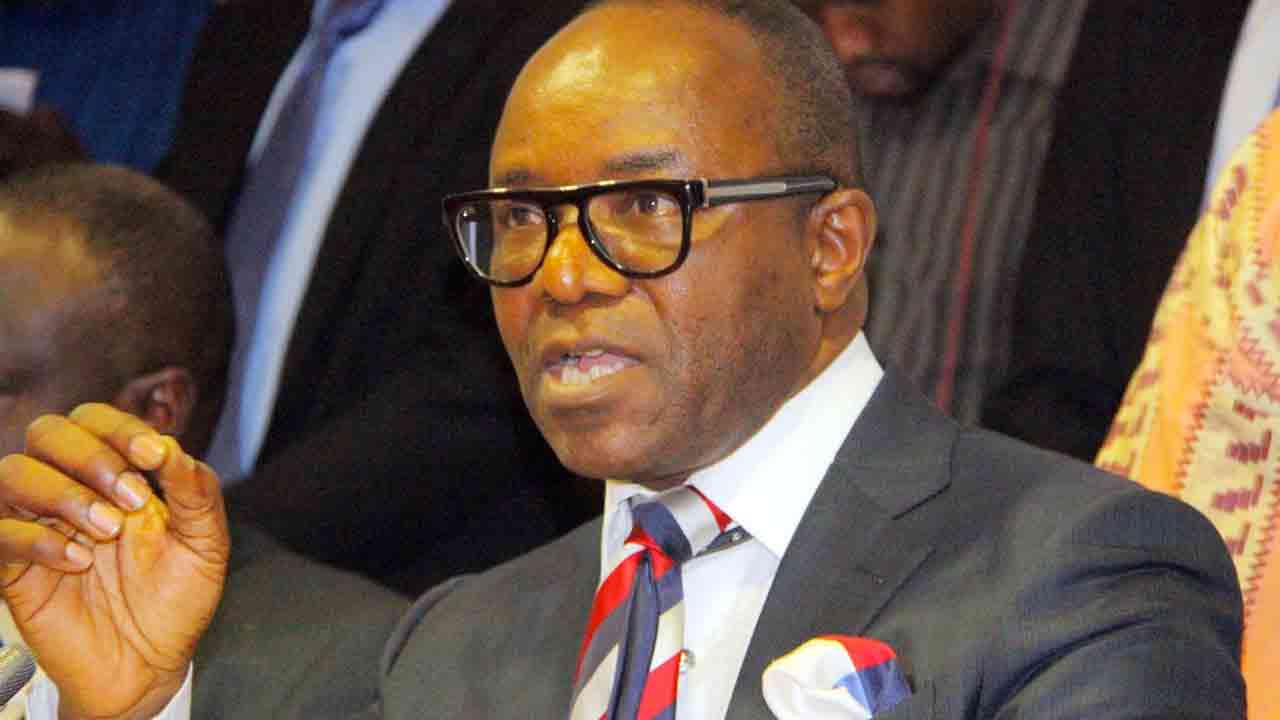- Your Daily Petrol Consumption Claim Untenable, Falana Tells Kachikwu
Human rights lawyer, Femi Falana (SAN), on Tuesday stated that the daily petrol consumption claim by the Minister of State for Petroleum Resources, Ibe Kachikwu, was untenable.
In a letter to the minister entitled, ‘Request for information on fuel importation and sundry matters’, Falana explained that the Nigerian National Petroleum Corporation had in December 2017 put the nation’s daily consumption of Premium Motor Spirit, otherwise called petrol, at 28 million litres.
He stated that the NNPC later announced in March this year that the daily consumption rate had climbed to 50 million litres, adding that few weeks ago, Kachikwu declared another figure of 60 million litres per day.
According to Falana, although the minister and the NNPC have explained that the rise in daily consumption of petrol is due to the smuggling of the commodity to neighbouring countries, the claim is still not tenable because of the low petrol consumption rate of the nations where the product is allegedly being smuggled to.
The letter to the minister, which was made available to our correspondent in Abuja, read in part, “In December 2017, the management of the NNPC disclosed that the nation’s consumption rate of fuel was 28 million litres per day and that subsidy cost was N726m per day, i.e., N261.4bn per annum. But on March 5, 2018, the Group Managing Director of the NNPC, Dr. Maikanti Baru, claimed that the figure had metamorphosed to 50 million litres per day and that the NNPC had spent $5.8bn (N1.7tn) on fuel importation in January and February 2018.
“Furthermore, at a public forum held in Abuja two weeks ago, you (Kachikwu) stated that the consumption rate of fuel had skyrocketed to 60 million and that the cost of subsidy was N1.4tn! We are not unaware that the increasing consumption rate has been blamed on the smuggling of imported fuel from Nigeria to neighbouring countries by some economic saboteurs.
“Assuming without conceding that the story of smuggling is true, the total volume of fuel consumed by Benin, Togo, Cameroon, Niger, Chad and Ghana is said to be less than 250,000 litres per day. You will agree with me that this does not explain the difference of 32 million litres per day between the consumption rate of imported fuel in December 2017 and March 2018.”
Falana added, “With respect to the alleged subsidy on fuel importation, you failed to disclose the amount realised from the sale of the 60 million litres at N145 per litre. You have also conveniently failed to account for the sale of the 445,000 barrels of crude oil allocated to the NNPC daily by the Federal Government.
“The convenient defence of smuggling as cheap justification for a gap of 32 million litres a day (at N145 per litre amounting N4.6bn daily) is untenable given the billions of naira continually expended on Project Aquila Software by the Petroleum Equalisation Fund, a parastatal under your watch in the petroleum ministry, to track every litre of petroleum product evacuated from the depots and sold at retail stations in the country.”
The human rights lawyer argued that since the Project Aquila Software had the capability to determine the identity of owners and locations of all trucks loading petroleum products in Nigeria, “why have your (Kachikwu’s) office and the NNPC continued to blame smuggling for the drain of N4.6bn daily on petroleum products?”
He asked the minister to state the number of truck owners involved in the alleged smuggling of the PMS who had been arrested and arraigned in court since Aquila had the database of all truck owners in the country.
Falana said, “In the light of the foregoing, I am compelled to request you to use your good offices to furnish me with copies of the following documents: Bill of Laden and the DPR (certified Cargo Discharged Certificates of the imported subsidised petroleum products into the country from December 2017 to March 2018; Offshore Processing Agreements pertaining to the sale of the 445,000 barrels of crude oil per day plus any additional crude barrels approved for domestic consumption from December 2017 to March 2018.
“He also asked for volumes of domestic refined products by the nations’ local refineries against gross expenditure on refinery turnaround maintenance/expended budget in 2017. Gross amount of forex differential or forex subsidy (gap between the CBN rate and special rate approved for fuel importation) from December 2017 to March 2018; amount expended by PEF on Project Aquila from inception aimed at tracking petroleum trucks nationwide to prevent smuggling of petroleum products.”
Falana stated that his request was made pursuant to the Freedom of Information Act and told the minister that “your reply should be received within seven days of the receipt of this letter.”
“Since the Buhari administration has undertaken to promote accountability and transparency in the management of the affairs of the NNPC, we have no doubt that you will accede to our request,” Falana added.
When contacted on the letter, the spokesperson for the Federal Ministry of Petroleum Resources, Idang Alibi, promised to revert to our correspondent.
He, however, did not do so several hours after promising to revert, neither did he answer calls to his mobile phone.

 Forex3 weeks ago
Forex3 weeks ago
 Naira3 weeks ago
Naira3 weeks ago
 Billionaire Watch3 weeks ago
Billionaire Watch3 weeks ago



 Naira3 weeks ago
Naira3 weeks ago






 Naira3 weeks ago
Naira3 weeks ago




 Naira2 weeks ago
Naira2 weeks ago




 Naira4 weeks ago
Naira4 weeks ago






 Naira2 weeks ago
Naira2 weeks ago
























